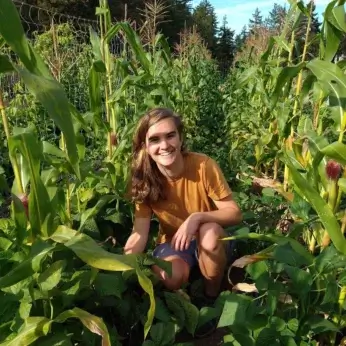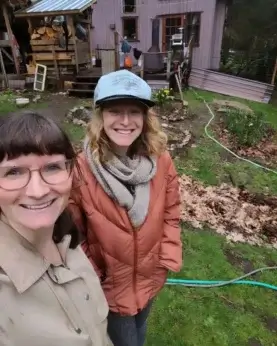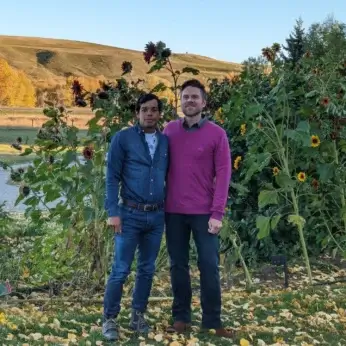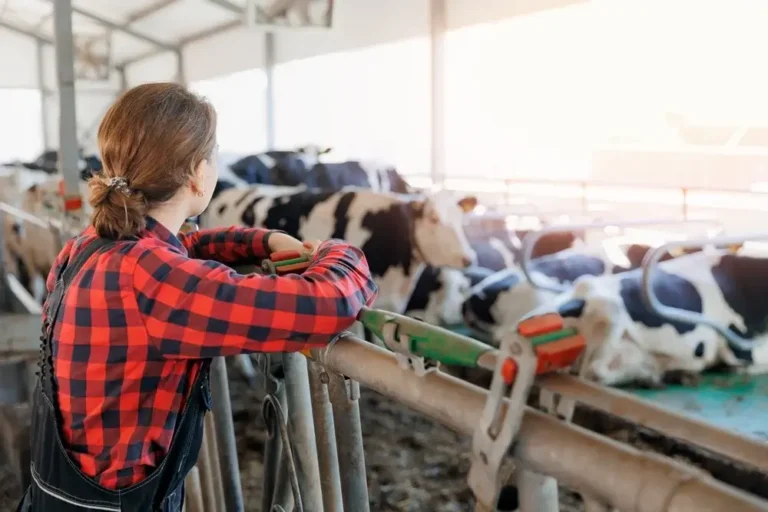For younger folks inquisitive about a profession in agriculture, there could be many limitations of their path. Land costs proceed to rise, grants and academic alternatives are exhausting to come back by, and people who did not develop up in a farming household have a steep studying curve.
Once we began protecting Future Farmers, we wished to listen to immediately from the folks going through these obstacles: younger farmers themselves. What issues are they actually scuffling with? Are our perceptions of the agricultural panorama correct or do they see a distinct future unfolding?


Sara Dent. Photographs courtesy of @youngagrarians/Instagram.
Fashionable farmer sat down to speak with Sara Dent, co-founder of younger farmerto speak concerning the issues younger farmers face and a few shocking methods we are able to begin to clear up them.
This interview has been edited for size and readability.


Fashionable Farmer: It looks as if there are a number of issues younger farmers face when beginning out: prices, information gaps, entry to land, and extra. Do you see a typical thread that ties these points collectively, or does it seem to be we will should deal with issues individually?
Sara Dent: Properly, to begin, I need to be aware that I’m on Tla’amin, Klahoose, and Homalco Nation lands. And I feel this dialog is actually fascinating, as a result of if you happen to stay up for the colonial interval, and have a look at how land was managed and the richness of the techniques, you see the method of colonization used a number of pure sources. It breaks down the folks and panorama ecology and incorporates it into the British land tenure system. And now that we’re in 2024, we’ve got market failure circumstances for agriculture. And there may be low acceptance on the institutional stage for recognizing these market failure circumstances.
After I first based Younger Agrarians, it was actually pushed by facilitating business synergies and addressing three key limitations, that are entry to land, entry to capital and entry to information .
The half the place we are able to begin is accessing information and facilitating that via farmer-to-farmer conversations. Farmers are those who prepare new farmers and help new farmers to allow them to get their toes underneath them. We started engaged on the problem of land entry in 2016 and we are actually working to extend our affect round entry to capital, driving coverage on the municipal, federal and provincial ranges. However coverage is actually like a residing organism. It consists of everybody. It consists of eaters, it consists of growers, it consists of banks [that] is lending to the agricultural area, governments are managing the agricultural area and creating eligibility standards to judge the whole business.
And we’re seeing a severe decline within the agricultural sector; The agricultural inhabitants in Canada may be very low. Certainly, the latest census confirmed that [of the 262,455 farm operators] lower than 23,000 underneath 35 years outdated.


MF: So if coverage is essentially the most unwieldy of the areas of affect you talked about, what are the coverage challenges?
SD: One of many huge coverage challenges for brand new farmers within the nation is that, for a lot of governments, their benchmark is larger business, coverage is actually pushed by greater business, bigger farm. However once you have a look at the brand new era coming in, they needed to begin someplace. Subsequently, we frequently discuss “applicable scale” insurance policies.
For younger folks coming into the sector, who’re truly accessing land, how can we help them? After which the people who find themselves in your startup for one, two, 5 years? They usually all begin at completely different scales. However we actually attempt to focus with the federal government on speaking about the proper scale. Outdated market evaluation mentioned “greater is best”. However many giant farms have big debt ratios and if they’ve a foul yr, it actually hurts them. What they do have, nevertheless, is that in the event that they personal the land, a minimum of they’ve fairness within the land.
You could discover that smaller scale fashions can truly be extra financially environment friendly than bigger scale fashions. New farms right now have to determine what their worth proposition is, they should be actually laser-focused on determining how they are going to survive and what their area of interest is. So in my thoughts, considered one of these huge coverage modifications is knowing that greater shouldn’t be at all times higher.


Ardeo, farmer at Rake & Turnip Farm in Saanich, BC. Ardeo was matched with farmland via the BC Land Matching Program in 2020. Pictures by way of @youngagrarians/Instagram
MF: You talked about that there are three important areas the place new farmers can wrestle: entry to capital, information, and land. Let’s begin with capital. Why is it tougher for younger folks to entry capital or loans?
SD: Subsequently, conventional lending is predicated on leveraging belongings as collateral to get mortgage approval. For those who have a look at the brand new era of farmers which are coming in, they do not essentially personal land, so they do not have something as collateral they usually cannot entry conventional loans. They cannot afford to purchase actual property, they do not qualify for a mortgage, they usually cannot entry a mortgage.
What we’re aiming to realize Canada Agricultural Mortgage Act up to date to permit farmers to offer loans and dealing capital primarily based on traits, so they don’t have to personal land to entry the mortgage program. There is a actually fascinating mortgage program in Quebec known as FIRA, its founder, Paul, has carried out wonderful work. It is a land acquisition fund, after which they promote it again to the farmers once they get the enterprise.


Kailli from Dancing Dandelion Farm (left) mentors Lolo from Buttercup Sandwich Florals. Picture by way of @youngagrarians/Instagram
However right now there’s a giant lending hole within the nation. For instance, there are not any provincial lenders in British Columbia that supply personality-based lending. In Ontario, Honest Finance Fund there’s a nationwide fund for BIPOC candidates, as a result of these candidates can not get loans from conventional lenders. For instance, First Nations farmers on reserve land, they don’t seem to be land title holders, so accessing that mortgage capital shouldn’t be attainable.
MF: Entry to land can also be linked to the problem of entry to capital. Many individuals can not afford to purchase land.
SD: Yeah completely. Yearly, farmland values are revealed nationally, trying on the per acre charge, and I at all times discover the per acre charge to be a bit of dishonest, as a result of you may have a median charge per acre for a complete province, however if you happen to’re attempting to purchase one thing in northern BC versus southern BC, it should be utterly completely different per acre.
However for individuals who cannot afford land, leasing turns into an essential choice for brand new farmers, these simply beginning out — and, , guaranteeing that that farming is really for them, that they’ve a worth proposition within the enterprise they’re operating, that they’re working on the proper scale. So we’re operating BC Land Matching Program, affords useful resource guides to farmers throughout the nation to assist them navigate that leasing area. As a result of when renting, you might be prone to dropping the property if the owner sells it. Or what if the proprietor dies and the kids inherit the land? How do you negotiate a lease that has all the proper phrases in your farming operation? It is a part of the tutorial useful resource work that Younger Farmers has been doing over the previous decade, attempting to raised put together new entrants to leasing properties. We discovered loads from taking a look at US fashions, like Everlasting land And California FarmLink.


MF: And eventually there may be entry to information. Younger Farmers has an apprenticeship program that connects new farmers with working mentors to assist bridge that hole.
SD: Sure, we work with farmers doing ecological farming who need schooling and coaching. I feel we have got about 70 farms working in this system and over 80 younger folks within the apprenticeship program, however within the huge image, we actually want about 500 apprentices and farms per province. Proper now, we’re doing that program in Western Canada, British Columbia to Manitoba. And the query is, will this system be efficient on the nationwide stage? The complexity there may be discovering the proper farms after which issues like housing and being very appropriate for learning.
It is wonderful when somebody is available in they usually have this life-changing expertise and the lights come on they usually love farming and that is their path ahead.
MF: It have to be very satisfying when it appears like a match between apprentice and farmer is definitely very thrilling.
SD: That is why I nonetheless do that job. We get notes from folks on a regular basis, like somebody does a enterprise boot camp, then you definately discuss to them two years later they usually’re operating their enterprise. And there are many good tales circulating on-line which are positive to maintain workers going.


Steve and Julian of Milpa Naturals are rising their farm and enterprise with the assistance of the Enterprise Advisor Community. Picture by way of @youngagrarians/Instagram
MF: We have talked about some community- and grassroots-level options, like your apprenticeship program. However what may clear up a few of these issues on the federal or coverage stage?
SD: I began performing some nationwide coverage writing work on behalf of the group in 2021. And I began to grasp that there are lots of people on the organizational stage who care about these points, however the information hole consciousness (from policymakers) is large. significant.
One factor I discuss loads is the eligibility standards for brand new entrants. I feel that is actually essential, as a result of new farmers are utterly underinvested in Canada and arguably additionally in the US, in North America usually, maybe even globally. They’re so underfunded that getting folks to consider their eligibility standards is actually essential.
I could be in a gathering with somebody engaged on eligibility standards for a monetary mortgage program and I will say ‘you may put a $50,000 greenhouse in your bank card after which wait to get reimbursed a number of months later?’ And lots of people notice, ‘oh, yeah. I can’t try this. I can not exit and purchase all this tools with my bank card and wait to be reimbursed.’
So I cleared the elephant within the room by getting straight to the eligibility standards. As a result of with out it, farmers taking a look at this utility type won’t ever have the ability to entry your program.
MF: This appears like a terrific place to begin for this dialog.
SD: Precisely. And a few legal guidelines want to vary, and a number of it’s nearly getting the proper folks on the desk again and again to vary the cultural dialog.
